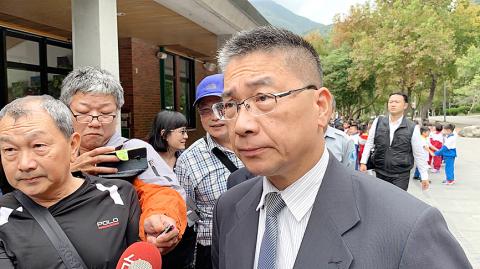Two executives of a Chinese company based in Hong Kong who have allegedly tried to influence Taiwanese elections were yesterday barred from leaving the nation following their detention at Taiwan Taoyuan International Airport on Sunday.
China Innovation Investment Ltd (中國創新投資) executive director Xiang Xin (向心) and his wife, acting director Kung Ching (龔青), were detained at the airport ahead of a flight to Hong Kong on suspicions that they breached the National Security Act (國家安全法).
Self-proclaimed Chinese spy William Wang Liqiang (王立強) on Saturday told Australian media that China Innovation Investment was a shell company “whose founding mission was to infiltrate Hong Kong, but was later tasked with influencing elections in Taiwan.”

Photo: Wang Chun-chi, Taipei Times
Following Wang’s allegations, Taiwanese authorities on Thursday last week found that Xiang and Kung entered Taiwan on their Hong Kong passports, with a return flight scheduled for Sunday.
They were stopped for questioning at the airport before being referred to the Taipei District Prosecutors’ Office on Sunday night.
The office yesterday confirmed that the Xiang and Kung had been released, but have been barred from leaving the nation pending further investigation.
Sources said that during questioning, the couple’s statements corresponded with a statement released by their firm on Monday — that they have no knowledge of Wang’s allegations and that he was never an employee of the company.
Wang had said that Xiang is really an intelligence officer with direct communication channels to the office of Chinese President Xi Jinping (習近平).
Xiang has helped Beijing establish top intelligence assets and conduct espionage operations in Taiwan and Hong Kong, he said.
Wang said that he in 2014 started working at China Innovation Investment as Kung’s painting instructor and later became a “middleman” for intelligence operations.
Sources said that Xiang and Kung told authorities that over the past few years they have been making monthly visits to Taiwan, with each stay lasting three to four days.
They reportedly said that Xiang is interested in the local real-estate market, while Kung is a fan of aesthetic medicine in Taiwan, which they both cited as the reason for their latest visit.

NATIONAL SECURITY THREAT: An official said that Guan Guan’s comments had gone beyond the threshold of free speech, as she advocated for the destruction of the ROC China-born media influencer Guan Guan’s (關關) residency permit has been revoked for repeatedly posting pro-China content that threatens national security, the National Immigration Agency said yesterday. Guan Guan has said many controversial things in her videos posted to Douyin (抖音), including “the red flag will soon be painted all over Taiwan” and “Taiwan is an inseparable part of China,” while expressing hope for expedited “reunification.” The agency received multiple reports alleging that Guan Guan had advocated for armed reunification last year. After investigating, the agency last month issued a notice requiring her to appear and account for her actions. Guan Guan appeared as required,

Japan and the Philippines yesterday signed a defense pact that would allow the tax-free provision of ammunition, fuel, food and other necessities when their forces stage joint training to boost deterrence against China’s growing aggression in the region and to bolster their preparation for natural disasters. Japan has faced increasing political, trade and security tensions with China, which was angered by Japanese Prime Minister Sanae Takaichi’s remark that a Chinese attack on Taiwan would be a survival-threatening situation for Japan, triggering a military response. Japan and the Philippines have also had separate territorial conflicts with Beijing in the East and South China

A strong cold air mass is expected to arrive tonight, bringing a change in weather and a drop in temperature, the Central Weather Administration (CWA) said. The coldest time would be early on Thursday morning, with temperatures in some areas dipping as low as 8°C, it said. Daytime highs yesterday were 22°C to 24°C in northern and eastern Taiwan, and about 25°C to 28°C in the central and southern regions, it said. However, nighttime lows would dip to about 15°C to 16°C in central and northern Taiwan as well as the northeast, and 17°C to 19°C elsewhere, it said. Tropical Storm Nokaen, currently

PAPERS, PLEASE: The gang exploited the high value of the passports, selling them at inflated prices to Chinese buyers, who would treat them as ‘invisibility cloaks’ The Yilan District Court has handed four members of a syndicate prison terms ranging from one year and two months to two years and two months for their involvement in a scheme to purchase Taiwanese passports and resell them abroad at a massive markup. A Chinese human smuggling syndicate purchased Taiwanese passports through local criminal networks, exploiting the passports’ visa-free travel privileges to turn a profit of more than 20 times the original price, the court said. Such criminal organizations enable people to impersonate Taiwanese when entering and exiting Taiwan and other countries, undermining social order and the credibility of the nation’s